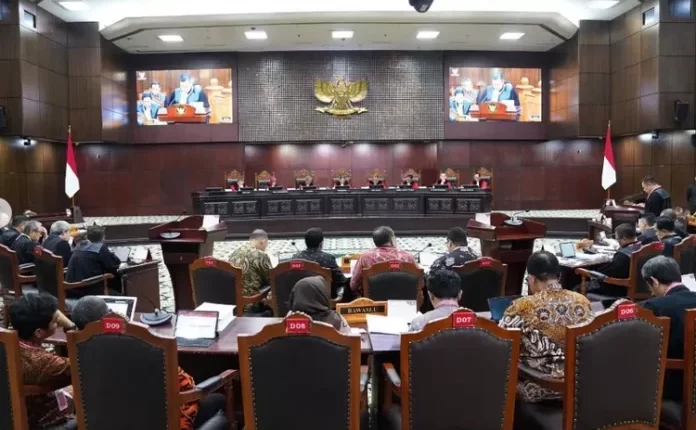Appreciation for Handling of Regional Election Result Disputes Through Legal Channels
By: Brigitta Marga Ayu )*
A healthy democratic process is not only measured by the implementation of honest and fair General Elections (Pemilu), but also by the available dispute resolution mechanisms. Regarding the implementation of the 2024 Regional Head Elections (Pilkada), disputes over Pilkada results are one of the important aspects that require serious handling. The legal path provided through the Constitutional Court (MK) is a concrete manifestation of the state’s efforts to maintain justice, stability, and the legitimacy of democracy.
The handling of regional election disputes by the Constitutional Court is an integral part of strengthening the democratic system in Indonesia. As a constitutional judicial institution, the Constitutional Court has a major task to ensure that every dispute is resolved fairly, transparently, and professionally. Constitutional Court Judge Enny Nurbaningsih emphasized that her party will avoid conflicts of interest in every stage of case handling.
According to Enny, this step is not new for the Constitutional Court. Experience in handling disputes over the results of previous General Elections and Presidential Elections (Pilpres) is a strong basis for ensuring that the trial process runs according to applicable procedural law. The Constitutional Court will also divide cases after the Constitutional Case Register Book (BRPK) is published on January 3, 2025. This division is carried out simultaneously with the case title, as an effort to optimize efficiency and ensure that each case is handled fairly and professionally.
Transparency is a key element in maintaining public trust in the legal process. To support this, the Constitutional Court has provided an online channel that allows the public to monitor the trial process. The Chairman of the Constitutional Court Honorary Council (MKMK), I Dewa Gede Palguna, explained that this monitoring mechanism not only provides direct access to the public, but also allows the MKMK to be proactive in overseeing the trial process.
Through online monitoring , the public can witness for themselves every stage of the trial, from the reading of the files to the reading of the verdict. This provides assurance that there are no violations of the code of ethics or behavior that harms the legal process. In addition, the MKMK will also not be passive in supervision. This mechanism positions the Constitutional Court as an institution that is not only open to public supervision, but also active in maintaining the integrity of the legal process.
The importance of transparency was also emphasized by an election law expert from the University of Indonesia, Titi Anggraini. According to her, every stage of handling the Pilkada dispute, starting from case registration to the trial process, must be open and can be monitored by the public. With professional, credible, and modern governance, the Constitutional Court can maintain its integrity as an independent and trusted constitutional court.
In dealing with the dispute over the results of the 2024 Pilkada, the Constitutional Court has shown a commitment that deserves appreciation. The Constitutional Court’s efforts to maintain transparency and accountability are in line with the hopes of the people who long for a fair legal system free from intervention. The Constitutional Court’s experience in handling various disputes over previous election results provides confidence that the 2024 Pilkada process can run according to applicable regulations. This is important to maintain political stability and public trust in the Pilkada results.
In addition to the role of the Constitutional Court, the public also has a big responsibility in supporting and overseeing the process of resolving disputes over the results of the 2024 Pilkada. Awareness to comply with legal channels shows democratic maturity. The public is also expected to help maintain conduciveness by not being easily provoked by fake news or inaccurate information. In the digital era like today, the spread of misinformation can create unnecessary unrest.
Appreciation is also given to the Constitutional Court for its proactive steps in involving the public through online monitoring mechanisms. This shows that the Constitutional Court not only maintains internal integrity, but also encourages active participation of the public in creating a healthy democracy. With the involvement of all parties, the process of resolving disputes over the results of the regional elections can be a reflection of a mature democratic system.
As an institution that is at the forefront of resolving disputes over regional election results, the Constitutional Court has demonstrated a strong commitment to justice and transparency. The steps taken, from case division to online monitoring, reflect efforts to create a fair, professional, and accountable legal process. With public support, the Constitutional Court can carry out its duties better, while strengthening the foundation of Indonesian democracy.
Success in handling election result disputes does not only depend on the Constitutional Court as a judicial institution, but also on the maturity of society in responding to differences of opinion. A fair and transparent legal process is key to maintaining social and political stability. With the commitment of the Constitutional Court and the support of the community, the 2024 Election can be an example of how disputes can be resolved through dignified legal mechanisms.
Through these steps, Indonesia shows that democracy is not only about electing leaders, but also about the ability to resolve differences peacefully and fairly. This is evidence that Indonesia’s democratic system is increasingly mature, with the supremacy of law as a main pillar in maintaining justice and stability of the country.
)* The author is a law student at Esa Unggul University
